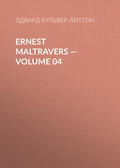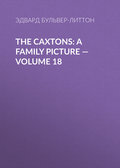
Эдвард Бульвер-Литтон
What Will He Do with It? — Volume 12
CHAPTER IX
THE LETTER ON WHICH RICHARD FAIRTHORN RELIED FOR THE DEFEAT OF THE CONSPIRACY AGAINST FAWLEY MANOR-HOUSE. BAD ASPECTS FOR HOUSES. THE HOUSE OF VIPONT IS THREATENED. A PHYSICIAN ATTEMPTS TO MEDICINE TO A MIND DISEASED. A STRANGE COMMUNICATION, WHICH HURRIES THE READER ONTO THE NEXT CHAPTER.
It has been said that Fairthorn had committed to a certain letter his last desperate hope that something might yet save Fawley from demolition, and himself and his master from an exile's home in that smiling nook of earth to which Horace invited Septimius, as uniting the advantages of a mild climate, excellent mutton, capital wine; and affording to Septimius the prospective privilege of sprinkling a tear over the cinder of his poetical friend while the cinder was yet warm; inducements which had no charm at all to Fairthorn, who was quite satisfied with the Fawley southdowns—held in just horror all wishy-washy light wines—and had no desire to see Darrell reduced to a cinder for the pleasure of sprinkling that cinder with a tear.
The letter in question was addressed to Lady Montfort. Unscrupulously violating the sacred confidence of his master, the treacherous wretch, after accusing her, in language little more consistent with the respect due to the fair sex than that which he had addressed to Sophy, of all the desolation that the perfidious nuptials of Caroline Lyndsay had brought upon Guy Darrell, declared that the least Lady Montfort could do to repair the wrongs inflicted by Caroline Lyndsay, was—not to pity his master!—that her pity was killing him. He repeated, with some grotesque comments of his own, but on the whole not inaccurately, what Darrell had said to him on the subject of her pity. He then informed her of Darrell's consent to Lionel's marriage with Sophy; in which criminal espousals it was clear, from Darrell's words, that Lady Montfort had had some nefarious share. In the most lugubrious colours he brought before her the consequences of that marriage—the extinguished name, the demolished dwelling-place, the renunciation of native soil itself. He called upon her, by all that was sacred, to contrive some means to undo the terrible mischief she had originally occasioned, and had recently helped to complete. His epistle ended by an attempt to conciliate and coax. He revived the image of that wild Caroline Lyndsay, to whom HE had never refused a favour; whose earliest sums he had assisted to cast up— to whose young idea he had communicated the elementary principles of the musical gamut—to whom he had played on his flute, winter eve and summer noon, by the hour together; that Caroline Lyndsay, who when a mere child, had led Guy Darrell where she willed, as by a thread of silk. Ah, how Fairthorn had leapt for joy when, eighteen years ago, he had thought that Caroline Lyndsay was to be the sunshine and delight of the house to which she had lived to bring the cloud and the grief! And by all these memories, Fairthorn conjured her either to break off the marriage she had evidently helped to bring about, or, failing that, to convince Guy Darrell that he was not the object of her remorseful and affectionate compassion.
Caroline was almost beside herself at the receipt of this letter. The picture of Guy Darrell effacing his very life from his native land, and destroying the last memorials of his birthright and his home—the conviction of the influence she still retained over his bleak and solitary existence—the experience she had already acquired that the influence failed where she had so fondly hoped it might begin to repair and to bless, all overpowered her with emotions of yearning tenderness and unmitigated despair. What could she do? She could not offer herself, again to be rejected. She could not write again, to force her penitence upon the man who, while acknowledging his love to be unconquered, had so resolutely refused to see, in the woman who had once deceived his trust—the Caroline of old! Alas, if he were but under the delusion that her pity was the substitute and not the companion of love, how could she undeceive him? How say—how write—"Accept me, for I love you." Caroline Montfort had no pride of rank, but she had pride of sex; that pride had been called forth, encouraged, strengthened, throughout all the years of her wedded life. For Guy Darrell's sake, and to him alone, that pride she had cast away—trampled upon; such humility was due to him. But when the humility had been once in vain, could it be repeated—would it not be debasement? In the first experiment she had but to bow to his reproach—in a second experiment she might have but to endure his contempt. Yet how, with her sweet, earnest, affectionate nature—how she longed for one more interview—one more explanation! If chance could but bring it about; if she had but a pretext—a fair reason, apart from any interest of her own, to be in his presence once more! But in a few days he would have left England forever—his heart yet more hardened in its resolves by the last sacrifice to what it had so sternly recognised to be a due to others. Never to see him more—never to know how much in that sacrifice he was suffering now—would perhaps suffer more hereafter, in the reaction that follows all strain upon purpose—and yet not a word of comfort from her—her who felt born to be his comforter.
But this marriage, that cost him so much, must that be? Could she dare, even for his sake, to stand between two such fair young lives as those of Lionel and Sophy—confide to them what Fairthorn had declared—appeal to their generosity? She shrunk from inflicting such intolerable sorrow. Could it be her duty? In her inability to solve this last problem, she bethought herself of Alban Morley; here, at least, he might give advice —offer suggestion. She sent to his house entreating him to call. Her messenger was some hours before he found the Colonel, and then brought back but a few hasty lines—"impossible to call that day. The CRISIS had come at last! The Country, the House of Vipont, the British Empire, were trembling in the balance. The Colonel was engaged every moment for the next twelve hours. He had the Earl of Montfort, who was intractable and stupid beyond conception, to see and talk over; Carr Vipont was hard at work on the materials for the new Cabinet—Alban was helping Carr Vipont. If the House of Vipont failed England at this moment, it would not be a CRISIS, but a CRASH! The Colonel hoped to arrange an interview with Lady Montfort for a minute or two the next day. But perhaps she would excuse him from a journey to Twickenham, and drive into town to see him; if not at home, he would leave word where he was to be found."
By the beard of Jupiter Capitolinus, there are often revolutions in the heart of woman, during which she is callous to a Crisis, and has not even a fear for a CRASH!
The next day came George's letter to Caroline, with the gentle message from Darrell; and when Dr. F———, whose apprehensions for the state of her health Colonel Morley had by no means exaggerated, called in the afternoon to see the effect of his last prescription, he found her in such utter prostration of nerves and spirits, that he resolved to hazard a dose not much known to great ladies—viz. three grains of plain- speaking, with a minim of frightening.
"My dear lady," said he, "yours is a case in which physicians can be of very little use. There is something on the mind which my prescriptions fail to reach; worry of some sort—decidedly worry. And unless you yourself can either cure that, or will make head against it, worry, my dear Lady Montfort, will end not in consumption—you are too finely formed to let worry eat holes in the lungs—no; but in a confirmed aneurism of the heart, and the first sudden shock might then be immediately fatal. The heart is a noble organ—bears a great deal—but still its endurance has limits. Heart-complaints are more common than they were;—over-education and over-civilisation, I suspect. Very young people are not so subject to them; they have flurry, not worry—a very different thing. A good chronic silent grief of some years standing, that gets worried into acute inflammation at the age when feeling is no longer fancy, throws out a heart-disease which sometimes kills without warning, or sometimes, if the grief be removed, will rather prolong than shorten life, by inducing a prudent avoidance of worry in future. There is that worthy old gentleman who was taken so ill at Fawley, and about whom you were so anxious: in his case there had certainly been chronic grief; then came acute worry, and the heart could not get through its duties. Fifty years ago doctors would have cried 'apoplexy!'—nowadays we know that the heart saves the head. Well, he was more easy in his mind the last time I saw him, and thanks to his temperance, and his constitutional dislike to self-indulgence in worry, he may jog on to eighty, in spite of the stethoscope! Excess in the moral emotions gives heart-disease; abuse of the physical powers, paralysis; both more common than they were—the first for your gentle sex, the second for our rough one. Both, too, lie in wait for their victims at the entrance in middle life. I have a very fine case of paralysis now; a man built up by nature to live to a hundred—never saw such a splendid formation—such bone and such muscle. I would have given Van Amburgh the two best of his lions, and my man would have done for all three in five minutes. All the worse for him, my dear lady—all the worse for him. His strength leads him on to abuse the main fountains of life, and out jumps avenging Paralysis and fells him to earth with a blow. 'Tis your Hercules that Paralysis loves; she despises the weak invalid, who prudently shims all excess. And so, my dear lady, that assassin called Aneurism lies in wait for the hearts that abuse their own force of emotion; sparing hearts that, less vital, are thrifty in waste and supply. But you are not listening to one! And yet my patient may not be quite unknown to your ladyship; for in happening to mention the other day, to the lady who attends to and nurses him, that I could not call this morning, as I had a visit to pay to Lady Montfort at Twickenham, she became very anxious about you, and wrote this note, which she begged me to give you. She seems very much attached to my patient—not his wife nor his sister. She interests me;—capital nurse-cleverish woman too. Oh! here is the note."
Caroline, who had given but little heed to this recital, listlessly received the note—scarcely looked at the address—and was about to put it aside, when the good doctor, who was intent upon rousing her by any means, said: "No, my dear lady, I promised that I would see you read the note; besides, I am the most curious of men, and dying to know a little more who and what is the writer."
Caroline broke the seal and read as follows: "If Lady Montfort remembers Arabella Fossett, and will call at Clare Cottage, Vale of Health, Hampstead, at her ladyship's earliest leisure, and ask for Mrs. Crane, some information, not perhaps important to Lady Montfort, but very important to Mr. Darrell, will be given."
Lady Montfort startled the doctor by the alertness with which she sprang to her feet and rang the bell.
"What is it?" asked he.
"The carriage immediately," cried Lady Montfort as the servant entered.
"Ah! you are going to see the poor lady, Mrs. Crane, eh? Well, it is a charming drive, and just what I should have recommended. Any exertion will do you good. Allow me; why, your pulse is already fifty per cent. better. Pray what relation is Mrs. Crane to my patient?"
"I really don't know; pray excuse me, my dear Dr. F———-."
"Certainly; go while the day is fine. Wrap up;—a close carriage, mind;—and I will look in to-morrow."
CHAPTER X
WHEREIN IS INSINUATED THE HIGHEST COMPLIMENT TO WOMAN EVER PAID TO HER SEX BY THE AUTHOR OF THIS WORK.
Lady Montfort has arrived at Clare Cottage. She is shown by Bridget Greggs into a small room upon the first floor; folding-doors to some other room closely shut—evidences of sickness in the house;—phials on the chimneypiece—a tray with a broth-basin on the table—a saucepan on the hob—the sofa one of those that serve as a bed, which Sleep little visits, for one who may watch through the night over some helpless sufferer—a woman's shawl thrown carelessly over its hard narrow bolster;—all, in short, betraying that pathetic untidiness and discomfort which says that a despot is in the house to whose will order and form are subordinate;—the imperious Tyranny of Disease establishing itself in a life that, within those four walls, has a value not to be measured by its worth to the world beyond. The more feeble and helpless the sufferer, the more sovereign the despotism—the more submissive the servitude.
In a minute or two one of the folding-doors silently opened and as silently closed, admitting into Lady Montfort's presence a grim woman in iron grey.
Caroline could not, at the first glance, recognise that Arabella Fossett, of whose handsome, if somewhat too strongly defined and sombre countenance, she had retained a faithful reminiscence. But Arabella had still the same imposing manner which had often repressed the gay spirits of her young pupil; and as she now motioned the great lady to a seat, and placed herself beside, an awed recollection of the schoolroom bowed Caroline's lovely head in mute respect.
MRS. CRANE.—"You too are changed since I saw you last,—that was more than five years ago, but you are not less beautiful. You can still be loved;—you would not scare away the man whom you might desire to save. Sorrow has its partialities. Do you know that I have a cause to be grateful to you, without any merit of your own. In a very dark moment of my life—only vindictive and evil passions crowding on me—your face came across my sight. Goodness seemed there so beautiful—and, in this face, Evil looked so haggard! Do not interrupt me. I have but few minutes to spare you. Yes; at the sight of that face, gentle recollections rose up. You had ever been kind to me; and truthful, Caroline Lyndsay—truthful. Other thoughts came at the beam of that face, as other thoughts come when a strain of unexpected music reminds us of former days. I cannot tell how, but from that moment a something more like womanhood, than I had known for years, entered into my heart. Within that same hour I was sorely tried galled to the quick of my soul. Had I not seen you before, I might have dreamed of nothing but a stern and dire revenge. And a purpose of revenge I did form. But it was not to destroy-it was to save! I resolved that the man who laughed to scorn the idea of vows due to me—vows to bind life to life—should yet sooner or later be as firmly mine as if he had kept his troth; that my troth at least should be kept to him, as if it had been uttered at the altar.
"Hush, did you hear a moan?—No! He lies yonder, Caroline Lyndsay—mine, indeed, till the grave us do part. These hands have closed over him, and he rests in their clasp, helpless as an infant." Involuntarily Caroline recoiled. But looking into that careworn face, there was in it so wild a mixture of melancholy tenderness, with a resolved and fierce expression of triumph, that, more impressed by the tenderness than by the triumph, the woman sympathised with the woman; and Caroline again drew near, nearer than before, and in her deep soft eyes pity alone was seen. Into those eyes Arabella looked, as if spellbound, and the darker and sterner expression in her own face gradually relaxed and fled, and only the melancholy tenderness was left behind. She resumed:
"I said to Guy Darrell that I would learn, if possible, whether the poor child whom I ill-used in my most wicked days, and whom you, it seems, have so benignly sheltered, was the daughter of Matilda—or, as he believed, of a yet more hateful mother. Long ago I had conceived a suspicion that there was some ground to doubt poor Jasper's assertion, for I had chanced to see two letters addressed to him—one from that Gabrielle Desinarets whose influence over his life had been so baleful —in which she spoke of some guilty plunder with which she was coming to London, and invited him again to join his fortunes with her own. Oh, but the cold, bloodless villany of the tone!—the ease with which crimes for a gibbet were treated as topics for wit!" Arabella stopped—the same shudder came over her as when she had concluded the epistles abstracted from the dainty pocketbook. "But in the letter were also allusions to Sophy, to another attempt on Darrell to be made by Gabrielle herself. Nothing very clear; but a doubt did suggest itself—'Is she writing to him about his own child?' The other letter was from the French nurse with whom Sophy had been placed as an infant. It related to inquiries in person, and a visit to her own house, which Mr. Darrell had recently made; that letter also seemed to imply some deception, though but by a few dubious words. At that time the chief effect of the suspicion these letters caused was but to make me more bent on repairing to Sophy my cruelties to her childhood. What if I had been cruel to an infant who, after all, was not the daughter of that false, false Matilda Darrell! I kept in my memory the French nurse's address. I thought that when in France I might seek and question her. But I lived only for one absorbing end. Sophy was not then in danger; and even my suspicions as to her birth died away. Pass on:—Guy Darrell! Ah, Lady Montfort! his life has been embittered like mine; but he was man, and could bear it better. He has known, himself, the misery of broken faith, of betrayed affection, which he could pity so little when its blight fell on me; but you have excuse for desertion—you yourself were deceived; and I pardon him, for he pardoned Jasper, and we are fellow-sufferers. You weep! Pardon my rudeness. I did not mean to pain you. Try and listen calmly—I must hurry on. On leaving Mr. Darrell I crossed to France. I saw the nurse; I have ascertained the truth; here are the proofs in this packet. I came back—I saw Jasper Losely. He was on the eve of seeking you, whom he had already so wronged—of claiming the child, or rather of extorting money for the renunciation of a claim to one whom you had adopted. I told him how vainly he had hitherto sought to fly from me. One by one I recited the guilty schemes in which I had baffled his purpose—all the dangers from which I had rescued his life. I commanded him to forbear the project he had then commenced. I told him I would frustrate that project as I had frustrated others. Alas, alas! why is this tongue so harsh?— why does this face so belie the idea of human kindness? I did but enrage and madden him; he felt but the reckless impulse to destroy the life that then stood between himself and the objects to which he had pledged his own self-destruction. I thought I should die by his hand. I did not quail. Ah! the ghastly change that came over his face—the one glance of amaze and superstitious horror; his arm obeyed him not; his strength, his limbs, forsook him; he fell at my feet—one side of him stricken dead! Hist! that is his voice—pardon me!" and Arabella flitted from the room, leaving the door ajar.
A feeble Voice, like the treble of an infirm old man, came painfully to Caroline's ear.
"I want to turn; help me. Why am I left alone? It is cruel to leave me so—cruel!"
In the softest tones to which that harsh voice could be tuned, the grim woman apologised and soothed.
"You gave me leave, Jasper dear. You said it would be a relief to you to have her pardon as well as theirs."
"Whose pardon?" asked the voice querulously.
"Caroline Lyndsay's—Lady Montfort's."
"Nonsense! What did I ever do against her? Oh—ah! I remember now. Don't let me have it over again. Yes—she pardons me, I suppose! Get me my broth, and don't be long!"
Arabella came back, closing the door; and while she busied herself with that precious saucepan on the hob—to which the Marchioness of Montfort had become a very secondary object—she said, looking towards Caroline from under her iron-grey ringlets:
"You heard—he misses me! He can't bear me out of his sight now—me, me! You heard!"
Meekly Lady Montfort advanced, bringing in her hand the tray with the broth-basin.
"Yes, I heard! I must not keep you; but let me help while I stay."
So the broth was poured forth and prepared, and with it Arabella disappeared. She returned in a few minutes, beckoned to Caroline, and said in a low voice:
"Come in—say you forgive him! Oh, you need not fear him; a babe could not fear him now!"
Caroline followed Arabella into the sick-room. No untidiness there; all so carefully, thoughtfully arranged. A pleasant room, too—with windows looking full on the sunniest side of the Vale of Health; the hearth so cheerily clear, swept so clean—the very ashes out of sight; flowers— costly exotics—on the table, on the mantelpiece; the couch drawn towards the window; and on that couch, in the gay rich dressing-gown of former days, warm coverlets heaped on the feet, snow-white pillows propping the head, lay what at first seemed a vague, undistinguishable mass—lay what, as the step advanced, and the eye became more accurately searching, grew into Jasper Losely.
Yes, there, too weak indeed for a babe to fear, lay all that was left of the Strong Man! No enemy but himself had brought him thus low- spendthrift, and swindler, and robber of his own priceless treasures- Health and Strength—those grand rent-rolls of joy which Nature had made his inheritance. As a tree that is crumbling to dust under the gnarls of its bark seems, the moment ere it falls, proof against time and the tempest, so, within all decayed, stood that image of strength-so, air scarcely stirring, it fell. "And the pitcher was broken at the fountain; and the wheel was broken at the cistern; vanity of vanities, saith the Preacher."
Jasper turned his dull eye towards Caroline, as she came softly to his side, and looked at her with a piteous gaze. The stroke that had shattered the form had spared the face; and illness and compulsory abstinence from habitual stimulants had taken from the aspect much of the coarseness—whether of shape or colour—that of late years had disfigured its outline—and supplied the delicacy which ends with youth by the delicacy that comes with the approach of death. So that, in no small degree, the beauty which had been to him so fatal a gift, was once more visible—the features growing again distinct, as wanness succeeded to the hues of intemperance, and emaciation to the bloated cheeks and swollen muscle. The goddess whose boons adorn the outward shell of the human spirit came back to her favourite's death-couch as she had come to the cradle—not now as the Venus Erycina, goddess of Smile and Jest, but as the warning Venus Libitina, the goddess of Doom and the Funeral.
"I'm a very poor creature," said Jasper, after a pause. "I can't rise— I can't move without help. Very strange supernatural! She always said that if I raised my hand against her, it would fall palsied!" He turned his eye towards Arabella with a glare of angry terror. "She is a witch!" he said, and buried his face in the pillow. Tears rolled down the grim woman's cheeks.
LADY MONTFORT.—"She is rather your good ministering spirit. Do not be unkind to her. Over her you have more power now than you had when you were well and strong. She lives but to serve you; command her gently."
Jasper was not proof against that sweet voice. With difficulty he wrenched himself round, and again looked long at Caroline Montfort, as if the sight did him good; then he made a sign to Arabella, who flew to his side and raised him.
"I have been a sad dog," he said, with a mournful attempt at the old rollicking tone—"a very sad dog-in short, a villain! But all ladies are indulgent to villains in fact, prefer them! Never knew a lady who could endure 'a good young man'—never! So I am sure you will forgive me, miss—ma'am. Who is this lady? When it comes to forgiveness, there are so many of them! Oh, I remember now—your ladyship will forgive me—'tis all down in black and white what I've done-Belles has it. You see this hand—I can write with this hand—this is not paralysed.
"This is not the hand I tried to raise against her. But /basta, basta!/ where was I? My poor head! I know what it is to have a head now!—ache, ache!—boom, boom-weight, weight-heavy as a church bell-hollow as a church bell—noisy as a church bell! Brandy! give me brandy, you witch!—I mean Bella, good Bella, give me brandy!"
"Not yet, Jasper dear. You are to have it every third hour; it is not time yet, dearest; you must attend to the doctor, and try to get well and recover your strength. You remember I told you how kind Lady Montfort had been to your father, and you wished to see and thank her."
"My father—my poor, poor father! You've been kind to him! Bless you, bless you! And you will see him? I want his pardon before I die. Don't forget, and—and—"
"Poor Sophy!" said Mrs. Crane.
"Ah yes! But she's well off now, you tell me. I can't think I have injured her. And really girls and women are intended to be a little useful to one. /Basta, basta/."'
"Mr. Darrell—"
"Yes, yes, yes! I forgive him, or he forgives me; settle it as you like.
But my father's pardon, Lady Montfort, you will get me that!"
"I will, I will."
He looked at her again, and smiled. Arabella gently let his head fall back upon the pillow.
"Throw a handkerchief over my face," he said feebly, "and leave me; but be in call; I feel sleepy." His eyes closed; he seemed asleep even before they stole from the room.
"You will bring his father to him?" said Arabella, when she and Lady Montfort were again alone. "In this packet is Jasper's confession of the robbery for which that poor old man suffered. I never knew of that before. But you see how mild he is now!—how his heart is changed; it is indeed changed more than he shows; only you have seen him at the worst— his mind wanders a little to-day; it does sometimes. I have a favour to ask of you. I once heard a preacher, not many months ago; he affected me as no preacher ever did before. I was told that he was Colonel Morley's nephew. Will you ask Colonel Morley to persuade him to come to Jasper?"







